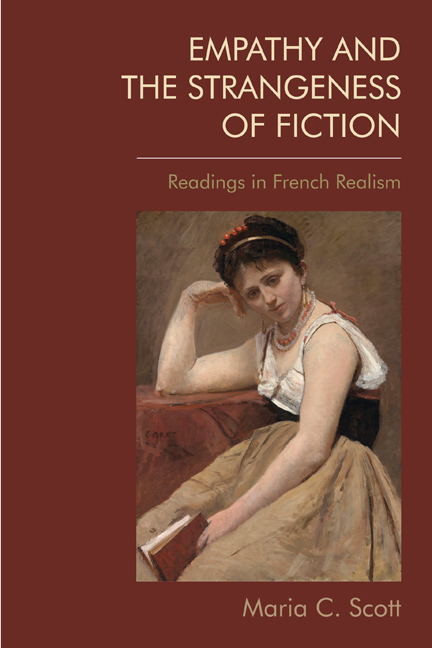Book contents
- Frontmatter
- Contents
- Dedication
- 1 Does Reading Fiction Boost Empathy? Psychological Approaches
- 2 Literary Approaches to Empathy
- 3 Fictional Strangers and the Strangeness of Fiction
- 4 Balzac: The Limits of Transparency and the Dangers of Opacity
- 5 Stendhal and the Two Opposing Demands
- 6 Sand and the Necessity of Suspicion
- 7 Towards an Empathetic Ethics of Fiction-Reading
- Bibliography
- Index
1 - Does Reading Fiction Boost Empathy? Psychological Approaches
Published online by Cambridge University Press: 17 October 2020
- Frontmatter
- Contents
- Dedication
- 1 Does Reading Fiction Boost Empathy? Psychological Approaches
- 2 Literary Approaches to Empathy
- 3 Fictional Strangers and the Strangeness of Fiction
- 4 Balzac: The Limits of Transparency and the Dangers of Opacity
- 5 Stendhal and the Two Opposing Demands
- 6 Sand and the Necessity of Suspicion
- 7 Towards an Empathetic Ethics of Fiction-Reading
- Bibliography
- Index
Summary
Fiction and the Empathy Question
For a long time, it has been suspected that exposure to fiction, and particularly literary fiction, has a valuable social function. This is one of the reasons why novels and short stories have featured, historically, on school curricula, why prison reading groups are considered a good thing and why student doctors can be required to read novels as part of their training. Efforts to quantify the social effects of engagement with fiction– often understood narrowly as narrative fiction in prose, or even more narrowly as literary prose fiction, but also regularly understood to include film and television drama– have become intensive over the past two decades. Various studies have found that people who engage frequently with fiction tend to have better social cognition or empathy than those who do not. As this wording suggests, preliminary experiments only proved correlation, rather than any causal relation, between exposure to fiction and capacity for empathy; in other words, it was possible that fiction-readers performed better on empathy tests simply because empathetic people are more likely than others to be drawn to fictional stories, rather than because fiction actively nurtures empathy. From 2012 onwards, however, psychological studies began to point more forcefully towards the existence of a causal link between exposure to fiction and the development of empathy.
One 2013 Dutch study, entitled ‘How Does Fiction Reading Influence Empathy?’, set out to ascertain whether the experience of emotional transportation while reading fiction would produce a measurable change in participants’ empathy levels one week after the event. This study proposed that fiction-readers who experienced emotional transportation while reading were likely to have integrated, over the following days, the fictional world into their own mental and emotional universes, thereby opening themselves up to the possibility of change. Using a standard self-reported empathy test, the degree of ‘empathic concern’ of each participant was measured directly before, directly after and one week after reading either a narrative fiction or a newspaper account. The study indicated that readers who had reported high levels of emotional involvement in the fictional story also reported an increase in their level of empathic concern one week later. The results of this study appeared to indicate causal links between emotionally involved fiction reading and higher levels of empathy.
- Type
- Chapter
- Information
- Empathy and the Strangeness of FictionReadings in French Realism, pp. 1 - 18Publisher: Edinburgh University PressPrint publication year: 2020



